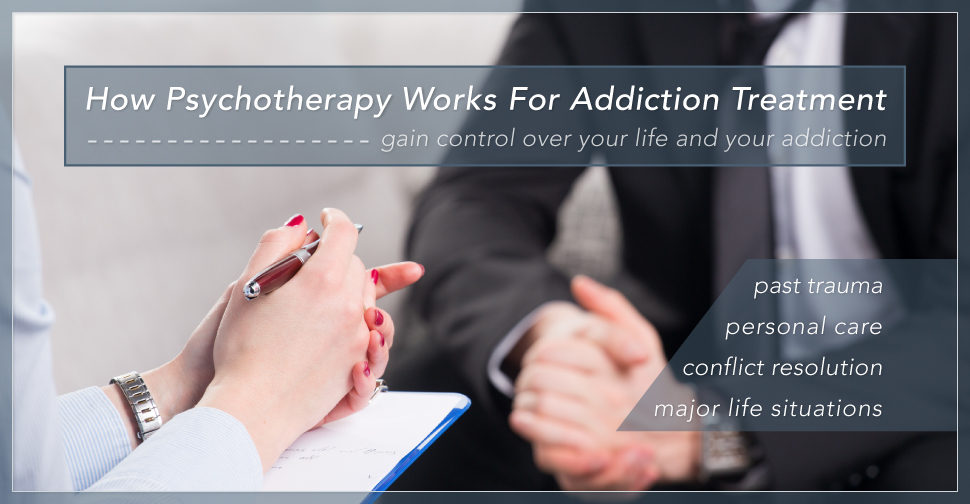
An addiction takes a massive toll on a person’s life. It is a complex and complicated situation that is rooted in a person’s history and perpetuated further by current maladaptive behaviors and mindsets. Therapy provides a person with a means to take control over these things, and in turn, their addiction.
The Role Of Therapy Within Addiction Treatment
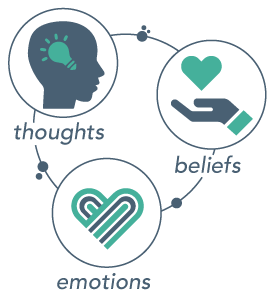 The purpose of therapy within addiction is to achieve or maintain sobriety and prevent relapse, while supporting you in your life as you contend with the environment around these pursuits. An addiction is rooted in a variety of triggers, behaviors, thoughts, emotions, situations, and social interactions. Therapy helps you to understand the role that these things have within your addiction and how they might precipitate or encourage your drug use. Your sessions will teach you how to either entirely avoid these things, or how to cope with them when they arise.
The purpose of therapy within addiction is to achieve or maintain sobriety and prevent relapse, while supporting you in your life as you contend with the environment around these pursuits. An addiction is rooted in a variety of triggers, behaviors, thoughts, emotions, situations, and social interactions. Therapy helps you to understand the role that these things have within your addiction and how they might precipitate or encourage your drug use. Your sessions will teach you how to either entirely avoid these things, or how to cope with them when they arise.
A trigger is a cue that you experience that elicits a drug-seeking reaction. It may be a person, place, event, memory, visual, auditory, or other sensory cue. Sometimes it is not possible to completely remove or avoid all triggers. In this case, you therapist will work with you in how to best manage the cravings and thought processes that arise when you encounter them.
Therapy addresses a diverse array of needs within a person’s life, here of some of the things that therapy can address:
- Coping with major life situations: Sometimes certain events, such as a death in the family, loss of a job, a breakup or divorce, or a major illness, may lead you to self-medicate. Therapy can help you to come to grips with these situations and learn how to deal with their implications.
- Coping with past trauma: A person may have experienced acts of physical or sexual violence, or may have witnessed or even been involved with causing these. Therapy can help you to cope with the ongoing effects of these situations. cause you stress within different areas of your life, including your job or within a relationship.
- Taking care of yourself: Sometimes you might not take the best care of yourself either before an addiction starts and also during it. Therapy can help you to realize this and develop better patterns of self-care. One example is for people who have poor sleeping habits. Therapy can help you to resolve this so that you are better prepared to handle the rigors of an addiction and recovery.

In some circumstance, during the course of addiction treatment, a person may yield the best results if treated by a combination of therapy- and medication-based treatments. This is called medication-assisted therapy or treatment (MAT). This approach supports the person on each level that the addiction is affecting them, treating not only the mental and emotional demands, but also that of the physical. This approach is especially useful for alcohol and opiate dependence.
Types Of Psychotherapy
There are numerous forms of psychotherapy, and just as each person and their situation is unique, so might be the treatment and subsequent form or forms of psychotherapy. Many individuals find that therapy which integrates more than one approach might work best to serve their needs. An addiction is a dynamic, multi-faceted affliction. For these reasons, the most appropriate and successful treatment needs to engage a person on many levels.
According to Harvard Health, psychodynamic therapy and cognitive behavioral therapy are the most popular forms, two forms that also hold success within the field of addiction treatment. However, each person and their circumstances are different, so the form of psychotherapy that is most successful can vary from individual to individual.
Mayo Clinic lists and describes the most effective forms of psychotherapy:
- Cognitive behavioral therapy (CBT), which helps you identify unhealthy, negative thought processes and behaviors and replace them with healthy, positive ones
- Dialectical behavioral therapy (DBT), a variant similar to CBT, that teaches behavioral skills to help you handle stress, manage your emotions, and improve your relationships with others
- Acceptance and commitment therapy, which helps you become aware of and accept your thoughts and feelings and commit to making changes, increasing your ability to cope with and adjust to situations
- Psychodynamic and psychoanalysis therapies, which focus on increasing your awareness of unconscious thoughts and behaviors, developing new insights into your motivations, and resolving conflicts
- Interpersonal psychotherapy, which focuses on addressing problems with your current relationships with other people to improve your interpersonal skills — how you relate to others, such as family, friends, and colleagues
Supportive psychotherapy, that reinforces your ability to cope with stress and difficult situations
In addition, if paired with other forms of psychotherapy, mentalization-based therapy (MBT) may prove beneficial to those who suffer with borderline personality disorder (BPD) as well as an addiction. MBT helps people to understand their thoughts and those of others, differentiating between them and helping them to have a more concrete sense of self and self-actualization.
Harnessing Your Thoughts, Emotions, And Beliefs
An addiction stems from and takes a toll on your physical, mental, and emotional states. Therapy will teach you to protect and strengthen these things by better understanding and controlling your thoughts and behaviors. Negative thoughts, behaviors, and reactions to situations can create a shaky foundation on which a drug addiction can take hold. Therapy will help you learn how to stop a negative thoughts or reactions before they transform into a negative action that might precede or become drug use and abuse.
Many times within an addiction there are other underlying, comorbid disorders, such as anxiety and depression that either birth, aggravate, or result from substance abuse and addiction. Therapy is an essential part in combating this. A person can’t fully recover if only one disorder is treated. If these things aren’t treated at the same time, it would be counterproductive because they could continue to exacerbate the addiction, negating a large part of your progress within your recovery.
In fact, the National Institute on Drug Abuse’s Principles of Drug Addiction and Treatment speaks of this, stating “as many as 6 in 10 people with an illicit substance use disorder also suffer from another mental illness; and rates are similar for users of licit drugs—i.e., tobacco and alcohol…Research indicates that treating both (or multiple) illnesses simultaneously in an integrated fashion is generally the best treatment approach for these patients.”
Prior to and during a drug addiction, a person commonly struggles with many of the following negative emotions: shame, fear, self-loathing, blame, anger, sadness, and loneliness. These emotions can be very draining and leave you devoid of the energy that is necessary to propagate positive emotions and mindfulness.
Therapy will illustrate to you the destructive qualities of these emotions and their many times unfounded roots. Often a person will create a situation in their head that is unrealistic or blown out of proportion, allowing these negative emotions a space in which to fester.
Stress is one of the biggest causes of drug abuse and addiction. Many times a person feels incapable of handling this stress on their own and turns to drugs to moderate or self-medicate the stressful situations. Therapy will direct you towards healthy and proactive ways by which you can gain control over and alleviate your stress level.
What To Expect During Psychotherapy
Your first session sets the foundation for every session thereafter. This is an opportunity for the therapist to get to know you and understand your situation and addiction; that way they can determine the best avenue of care and treatment for you. It is crucial for your success that you strive to be as honest and open as you can be about your life, addiction, and any other relevant information that might influence your drug or alcohol abuse. The more information they have to work with, the greater chance that they have of offering you thorough care that promotes lasting effects and support you as you work toward recovery.
Prior to, or during your first session, you will likely fill out a drug or alcohol screening. This is a self-report questionnaire that asks questions about your drug and/or alcohol use, and the behaviors, thoughts, circumstances, and reactions that revolve around it. Your therapist will then review this information and do a more thorough evaluation that will allow them the chance to flesh out the what they’ve gathered from this initial input. Paired with the type and intensity of your drug use, this helps give the therapist direction so they know how to best direct their focus during your sessions and treatment.
Due the the intimate, and at times, straight forward nature of the conversations that you will be having with your therapist, you may feel like giving up or walking away. Bear in mind this is a completely natural reaction, but despite this, it is important that you persist in moving forward through the progression of your dialogue. Remember, change and improvement take time. Putting in the work allows you the opportunity to gain control over your life and your addiction.
If you have any questions throughout your therapy or treatment you should ask. Remember, this is not just a time for them to ask you questions. You should always be aware of the goals and direction that the therapy is taking. This is a two-way street. Having an open dialogue between yourself and your addiction treatment team is just one more thing that will help you lay a solid foundation for your recovery.
Finding A Therapist Or Program That Fits
They key to having a successful experience with therapy is having the right person or team behind you. Every person is unique. Each person who struggles with substance abuse and addiction has a history and recovery journey that is specific to their experience and needs. If you do not feel comfortable with your therapist, consider trying someone else. Now, as we mentioned before, there are certain times where subject matter and conversations might make you uncomfortable—this is different and could occur regardless of who the individual is. Here, we’re talking about your rapport with your therapist. Having a good connection and relationship with the professionals who help you is very important for your success.
Psychotherapy can be administered by a variety of people, and in some cases, due to the nature, intensity, and form of your rehabilitation or treatment, you may work with more than one person within your addiction support team to receive this treatment. Therapy may be directed by a psychiatric nurse, social worker, counselor, psychologist, or psychiatrist.

Therapy is a crucial part of recovery and rehabilitation. It may take part outside of a treatment program or even after as a means to help you upkeep your recovery. In a treatment program, it might be offered within an outpatient or inpatient setting, and either in group and/or an individual mode.
How Will Therapy Make You Feel?
Therapy can at times be mentally and emotionally exhausting, to the extent that it might leave you physically tired as well. It is important to try and take care of yourself in all respects—get plenty of sleep so you can go into your sessions with the therapist and afterwards feel as centered as possible.
Psychotherapy carries little risks, but be aware that because of its nature, you might encounter some emotions, thoughts, memories, or mindsets that are painful or uncomfortable to deal with. You might become very angry, despondent, or encounter denial. You might at times cry or even have an angry outburst.
Remember, this is a very trying process for anyone, but coupled with the effects of the drugs or alcohol use or withdrawal, your emotions are on high alert, so you might be more apt to experience these things. The therapist will help you contend with the roller coaster of emotions you might feel, while guiding you toward coping with them and understanding their role or detriment within your sessions.
This is why it is important to be working with an individual who is highly skilled and trained to deal with these situations and direct you in how to best work through them. This measure of discomfort precipitates the healing and introspection that is necessary to move forward into healthier and more balanced behaviors and mindsets. Ideally, as you progress through therapy, a shift should occur—gradually you will begin to exhibit strength in the face of adversity and walk with greater balance and perspective throughout the stress and demands of your life.
Let Us Help You Find Balance Today
 Don’t bury your problems any longer or self-medicate them with drug abuse. We can help you to help yourself in finding healthy ways to restore balance, mindfulness, and wellness to your life. At DrugRehab.org, we have a staff that understands the diverse needs of a person struggling with an addiction. We are here to direct you toward the best therapy and treatment for your personal needs and sober life. Contact us today and get started with therapy treatment or rehabilitation.
Don’t bury your problems any longer or self-medicate them with drug abuse. We can help you to help yourself in finding healthy ways to restore balance, mindfulness, and wellness to your life. At DrugRehab.org, we have a staff that understands the diverse needs of a person struggling with an addiction. We are here to direct you toward the best therapy and treatment for your personal needs and sober life. Contact us today and get started with therapy treatment or rehabilitation.

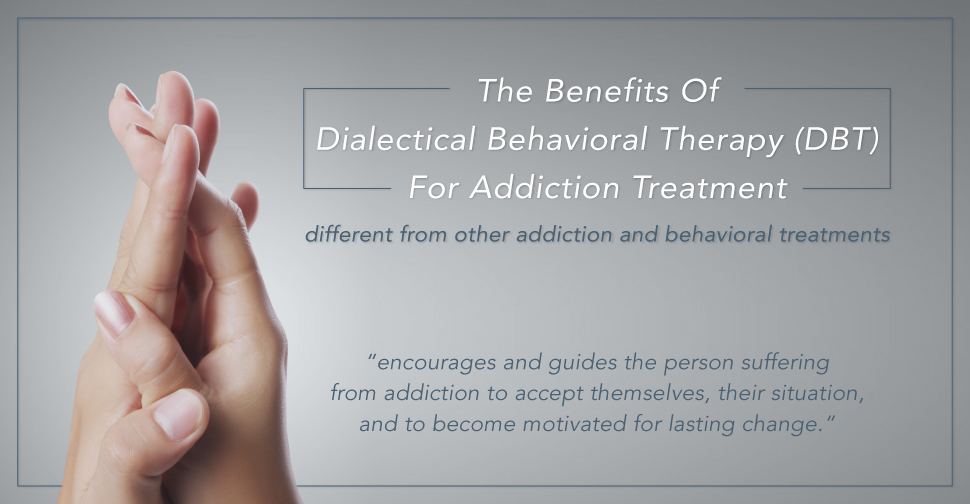
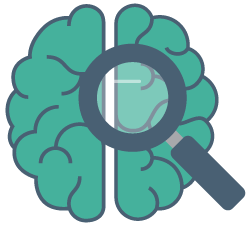 Dialectical Behavioral Therapy (DBT) is a type of cognitive behavioral psychotherapy that is used to treat borderline personality disorders. However, this therapy has been shown to be very advantageous for people suffering from addiction and substance use disorders. DBT involves various types of cognitive behavioral methods for helping those with mental disorders and addiction, including problem solving and stimulus control, cognitive restructuring and other treatments. The term dialectical relates to ideas and opinions that are opposing, and DBT focuses on the concept that a person suffering from a mental illness or addiction needs two opposing forces to heal: change and acceptance.
Dialectical Behavioral Therapy (DBT) is a type of cognitive behavioral psychotherapy that is used to treat borderline personality disorders. However, this therapy has been shown to be very advantageous for people suffering from addiction and substance use disorders. DBT involves various types of cognitive behavioral methods for helping those with mental disorders and addiction, including problem solving and stimulus control, cognitive restructuring and other treatments. The term dialectical relates to ideas and opinions that are opposing, and DBT focuses on the concept that a person suffering from a mental illness or addiction needs two opposing forces to heal: change and acceptance.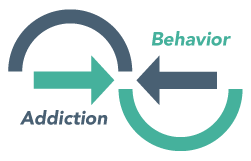 The brain is made up of many parts that work together to create our ability to perform various functions, produce emotions and develop our unique behaviors. Our brains consist of billions of neurons that send messages back and forth to the different cerebral structures. These networks of neurons are responsible for coordinating everything we feel, think and do. When drugs are in the brain, they affect it by hijacking its communication system, which is the network of neurons, and interfering with the messages they are sending. Interestingly, marijuana and heroin actually activate neurons because their chemical makeup resembles that of a natural neurotransmitter. Cocaine, on the other hand, can cause neurons to release unusually large doses of natural neurotransmitters or can prevent the natural recycling process of neurotransmitters from occurring.
The brain is made up of many parts that work together to create our ability to perform various functions, produce emotions and develop our unique behaviors. Our brains consist of billions of neurons that send messages back and forth to the different cerebral structures. These networks of neurons are responsible for coordinating everything we feel, think and do. When drugs are in the brain, they affect it by hijacking its communication system, which is the network of neurons, and interfering with the messages they are sending. Interestingly, marijuana and heroin actually activate neurons because their chemical makeup resembles that of a natural neurotransmitter. Cocaine, on the other hand, can cause neurons to release unusually large doses of natural neurotransmitters or can prevent the natural recycling process of neurotransmitters from occurring. As mentioned previously in this article, DBT focuses on two areas when working with patients suffering from addiction and mental health issues: change and acceptance. DBT pushes for the immediate and permanent cease of drug use and promotes acceptance by encouraging a non-judgmental environment. If the patient should relapse and take a drug, they are taught not to judge themselves and that a
As mentioned previously in this article, DBT focuses on two areas when working with patients suffering from addiction and mental health issues: change and acceptance. DBT pushes for the immediate and permanent cease of drug use and promotes acceptance by encouraging a non-judgmental environment. If the patient should relapse and take a drug, they are taught not to judge themselves and that a  DBT is a lot different from other addiction and behavioral treatments. It looks at the person suffering from addiction holistically but does not use a one-size-fits-all approach. DBT looks at how someone’s mental health is affecting their addiction and vice versa.
DBT is a lot different from other addiction and behavioral treatments. It looks at the person suffering from addiction holistically but does not use a one-size-fits-all approach. DBT looks at how someone’s mental health is affecting their addiction and vice versa.